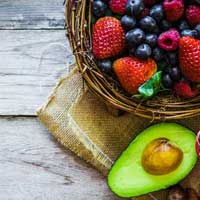What gives you a warm feeling? 🥰

Macular degeneration and foods for eye health

Whether you have recently been diagnosed with macular degeneration or you are just interested in learning about which types of foods are beneficial for your eyes, we've put together a guide on the subject of age-related AMD and recommended foods for eye health.
Get more health advice straight to your inbox...
What is macular degeneration?
When you develop macular degeneration, you experience changes to the macula (the small part of the retina that controls how sharp your eyesight is), which affects your central vision. While AMD will not cause full loss of sight, it will affect your direct vision, i.e. when you are reading or watching television.
There are two types: dry and wet. Wet macular degeneration develops quickly, but dry macular degeneration is a more gradual process and by far the most common. AMD is particularly common in those over 50, and affects women more so than men.
What are the signs and symptoms?
With macular degeneration, your vision becomes increasingly blurred and you may experience some of the following in varying degrees:
- Shadowy areas when looking directly at something
- Difficulty distinguishing facial features
- Colours looking less sharp
- Difficulty reading, especially small print
- Straight lines looking wavy
- Hallucinations in the form of colours, shapes and light (wet AMD)
When to seek help
You should seek help if your vision is gradually getting worse or if you suddenly notice blind spots or shadowy areas in your central vision. You may have to do some tests or get referred to a specialist depending on what your GP finds.
Join over 200,000 users on Gransnet today
Foods for eye health
You may be able to help prevent AMD from getting worse by eating a healthy, varied diet and avoiding alcohol. Research suggests that smoking increases your chances of developing AMD significantly. While there is currently no way to treat it, it is commonly believed that including high amounts of certain vitamins in your diet may help to improve your eye health.
While it is a good idea to eat these foods, don't forget to keep a balanced diet. Including too much spinach, for example, may be harmful to those who are prone to developing kidney stones. If you are concerned about your diet, consult your GP or a nutritionist.
1. Spinach
"Spinach is one of my favorite vegetables. You can buy it (in season) pre-washed in bags, then it just needs a few minutes in the microwave."
The antioxidant vitamins in dark leafy vegetables, such as spinach, contain high levels of lutein which is believed to benefit people with macular degeneration. Although spinach is in season during spring, it is generally available throughout the year either fresh or frozen. Well known for its nutritional value, spinach is rich in iron and a fantastic source of vitamin K, which is important for maintaining bone health. Naturally occurring cartenoids, the plant pigments responsible for the bright colours of fruits and vegetables (especially lutein), are high in spinach making it a great dietary supplement.
2. Oranges and other fruit
Lutein and the antioxidant zeaxanthin can also be found in fruit such as oranges, lemons, mango and grapefruit. These fruits are also high in vitamin C, which is essential for fighting age-related macular degeneration.
3. Kale
"Try roasting kale in the oven. Cut out the central stalk, spray or drizzle with a little olive (or any) oil and put into a hot oven on a baking tray for three to five minutes. Be careful as it's easy to burn it!"
Despite being in season from late autumn to early spring, kale is often available throughout the year. Of the two types of kale, smooth and curly, the latter is most common. Another great source of lutein, kale also contains high amounts of vitamins K, A and C as well as vitamin B6 which is linked to the metabolism of carbohydrates. Other vegetables that help to improve eye health are: peas, broccoli and peppers and carrots.

4. Eggs
Fruits and vegetables are not the only source of these antioxidants - eggs also contain lutein, zeaxanthin, vitamin C and vitamin E so are a great alternative to fruit and vegetables.
5. Nuts and seeds
"I love breakfast cereals that contain nuts and seeds."
Nuts and seeds both contain a high level of vitamin E and are rich on omega-3 fatty acids. The likes of peanuts and chia seeds (also a superfood) are a great place to start if you're keen to add more nuts and seeds to your diet. Sprinkle the peanuts over a vegetable stir-fry and add chia seeds to your morning porridge.
6. Fish
As well as regulating blood pressure and heart rate, it is believed that the omega-3 fatty acids in fish are also benefical to eye health. It is recommended that you try to include fish in your diet two to three times a week. The fish with the highest levels of omega-3 include tuna, salmon, mackerel and anchovies, to name but a few.
Try these recommended recipes:
- Haddock and spinach
- Spinach, avocado and pine nut pasta
- Salmon and spinach stir-fry
- Chicken, kale and lemongrass stir-fry
For more information and to get support if you think you're suffering from macular degeneration, visit the Macular Society website.
Disclaimer: The information on our health pages is only intended as an informal guide and should not be treated as a substitute for medical advice. Gransnet would urge you to consult your GP before you begin any form of treatment if you have existing health conditions and/or are taking medication.
Images: Shutterstock



